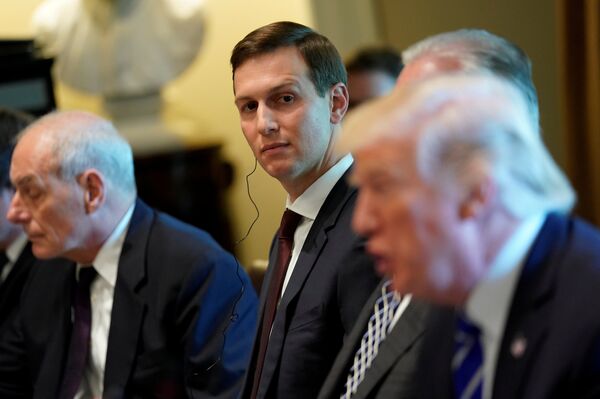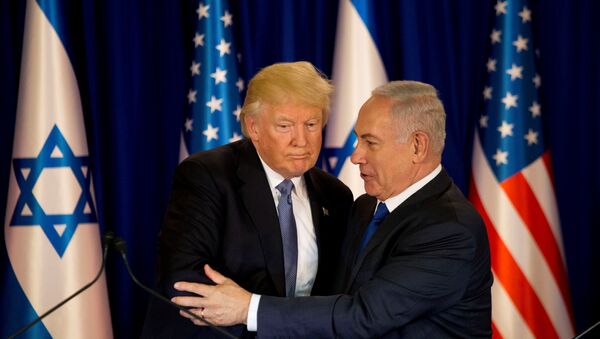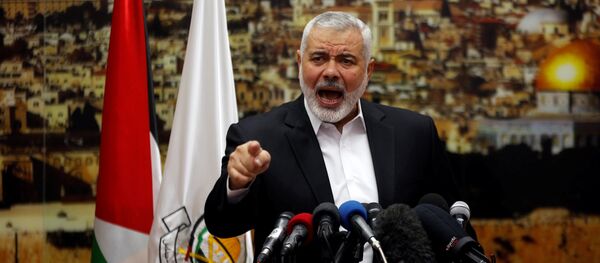Leaders from around the world, including the US's own European allies, have broadly condemned the US president's move, with the sharpest criticism coming from Muslim leaders. Palestinian political groups, including Palestinian Authority President Mahmoud Abbas and Hamas, reacted with indignation and anger. Abbas said the decision to recognize Jerusalem and move the US Embassy "destroyed" the prospects for a two-state solution, while Hamas leader Ismail Haniyeh called for a new intifada.
Speaking to Radio Sputnik, Dr. James. L Gelvin, a professor of Modern Middle Eastern History at the University of California, Los Angeles, outlined the disastrous and possibly dangerous implications of Washington's decision for the US and its partners.
"What Donald Trump has done is brought to an end the Oslo process, the direct negotiations between Israel and the Palestinians over a two state solution," the academic said. "This sounds very cynical, but if you look at the record, Donald Trump's Middle East policy [seems to be] to look at what Barack Obama did and do the opposite."
Third, by bowing to the Israeli right wing, the United States has ceded its position as an honest broker in the Israeli-Palestinian conflict. It will never be able to convince the Palestinians to once again put their faith in American-sponsored negotiations. Finally, American recognition of an undivided Jerusalem as the Israeli capital undercuts Israeli moderates, as unpowered as they might be."
Sputnik: What can you say about the threat of terrorism and violence to the US and its allies as a result of this decision?
Dr. Gelvin: The domestic violence that we see in the case of ISIS [Daesh], for example, where lone wolves do something within the borders of the United States – that's not likely to come about as a result of this. I think what's likely however is that within various Muslim-majority states, you are going to see a reaction, you are definitely going to see a reaction, for example, in the West Bank. Whether or not this is going to result in the long-anticipated Third Intifada, a third Palestinian uprising, we don't really know.
There are other places as well [where violence may occur]. There have been various points at which things that have taken place and American policy have inflamed Arab opinion and embassies in various Arab states, for example, have been under threat. But the more likely possibility is large-scale protest movement and widespread anti-American sentiment.
Angry Palestinians in #Gaza set fire to the flags of America and the Israeli occupation in protest to Trump administration's plan to announce #Jerusalem as the capital of "Israel".#HandsOffAlQuds#GroupPalestine #MB #قروب_فلسطيني #لا_لنقل_السفاره pic.twitter.com/2ePlA4s8YX
— Be a Palestinian (@palestinefree0) 6 декабря 2017 г.
Dr. Gelvin: Theresa May, for example, has said that this would be a bad idea. America's allies are appalled by the idea of doing this. Most have signed on to the Roadmap for Peace, the idea that the United States and others should broker some sort of negotiations between Israel and the Palestinians. Anything taking place that would make sure that the two sides will not be able to get together they're very much opposed to. America's allies are absolutely appalled.
There is no reason for this to take place now. It's even irrational from Trump's point of view. Trump has deployed his son-in-law to bring about some sort of negotiated settlement, so this is going to undercut his own family's ability to bring about some sort of positive impact on the Israel-Palestine conflict.

Dr. Gelvin: It very well may be that the Mueller investigation – the association or 'Russian meddling' in American elections; that has turned a corner over the last couple of days. [So the Jerusalem decision] may very well be to take Americans' minds off of what's going on with that. After all, Donald Trump during the campaign promised evangelical Christians and right-wing Orthodox Jews that the United States was going to make this move.
Obviously, he's trying to shore up his support here at home in light of the current investigations. So it's very, very likely that this is a tail wagging the dog – that what he's doing is creating a diversion at the present time. That's the only thing that I can think of. The other motivation very well could be is that the man is just totally irrational, and the foreign policy of the man is totally irrational.




